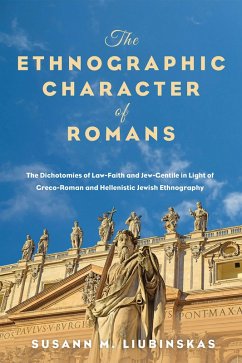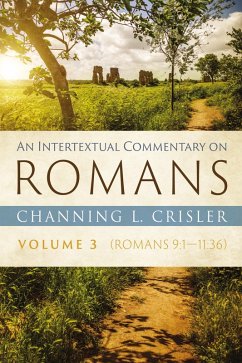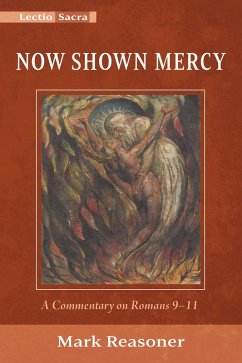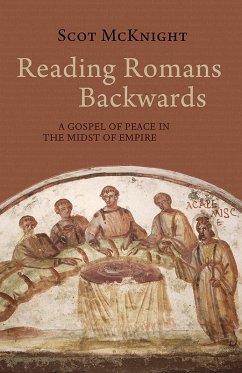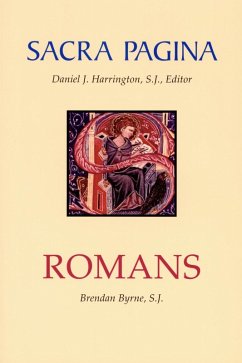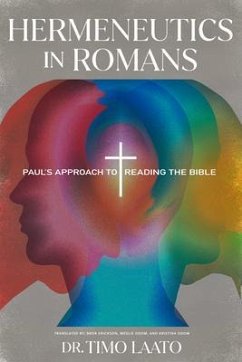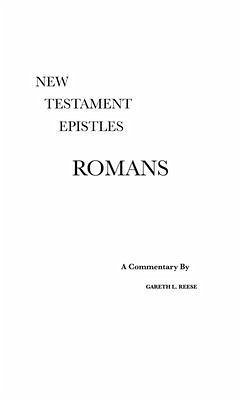
Romans (eBook, ePUB)
A Critical and Exegetical Commentary

PAYBACK Punkte
6 °P sammeln!
This is a phrase-by-phrase commentary and exposition of the New Testament book of Romans. This commentary is used as a college textbook, yet is suitable for lay church members.Romans was written by Paul during the same period as 1 Corinthians, Galatians, and 2 Corinthians. Though Paul had not yet visited the Roman churches to which the epistle is addressed, he still deals with profound topics requiring deep, critical thought. From start to finish in Romans, Paul's goal is nothing less than the shaping and molding of our world views. With deftness and sureness, Paul covers topics such as the re...
This is a phrase-by-phrase commentary and exposition of the New Testament book of Romans. This commentary is used as a college textbook, yet is suitable for lay church members.
Romans was written by Paul during the same period as 1 Corinthians, Galatians, and 2 Corinthians. Though Paul had not yet visited the Roman churches to which the epistle is addressed, he still deals with profound topics requiring deep, critical thought. From start to finish in Romans, Paul's goal is nothing less than the shaping and molding of our world views. With deftness and sureness, Paul covers topics such as the result of Adam's sin on the rest of God's creation, God's providence, the predestination of men and things, the Jews' place in God's administration of history, and the matter of how God saves individual people. Throughout, Paul relentlessly seeks to help us think God's thoughts after Him.
Romans 1:16-17 states the epistle's theme - that the gospel reveals God's way of saving man, a way that has always been conditioned on faithfulness. Paul also presses Christianity's exclusive claims - that God's way of saving man is found in the gospel and only in the gospel! There is simply no other Name or Way by which people can be saved only through Christ Jesus can we have right standing in God's sight.
No book or section of Scripture has been more important in church's history and in the lives of some of its most notable leaders than Romans. Over the centuries, this epistle has been used by God to change men and nations, based on the gospel's revolutionary message that "The righteous shall live by faith."
Romans contains many difficult doctrines. A series of Special Studies gives focused attention to topics such as the "Call" and "Grace" offered in the gospel; God's providence; sin; sanctification; the eternal security offered to believers; predestination; and faith, opinion, and love.
Since this commentary presumes the God-inspired nature of all Biblical writing, the author seeks to harmonize the teachings of Romans with other relevant Scriptures, and frequently examines the original language in which the epistle was written. An annotated bibliography is included to encourage readers to extend their own studies.
This commentary continues the author's series on the books of the New Testament. Written from the unique standpoint of the Restoration Movement, he can approach Scripture with no special theological doctrine or dogma to defend and explicate. This provides an unhindered freedom to listen to what the Holy Spirit would tell us within the pages of Scripture. By deliberately employing the grammatico-historical method of interpretation, God's Word is allowed to impress upon us the intent the Divine Author had in mind.
The author is Professor Emeritus of the New Testament at Central Christian College of the Bible (Moberly, MO).
Romans was written by Paul during the same period as 1 Corinthians, Galatians, and 2 Corinthians. Though Paul had not yet visited the Roman churches to which the epistle is addressed, he still deals with profound topics requiring deep, critical thought. From start to finish in Romans, Paul's goal is nothing less than the shaping and molding of our world views. With deftness and sureness, Paul covers topics such as the result of Adam's sin on the rest of God's creation, God's providence, the predestination of men and things, the Jews' place in God's administration of history, and the matter of how God saves individual people. Throughout, Paul relentlessly seeks to help us think God's thoughts after Him.
Romans 1:16-17 states the epistle's theme - that the gospel reveals God's way of saving man, a way that has always been conditioned on faithfulness. Paul also presses Christianity's exclusive claims - that God's way of saving man is found in the gospel and only in the gospel! There is simply no other Name or Way by which people can be saved only through Christ Jesus can we have right standing in God's sight.
No book or section of Scripture has been more important in church's history and in the lives of some of its most notable leaders than Romans. Over the centuries, this epistle has been used by God to change men and nations, based on the gospel's revolutionary message that "The righteous shall live by faith."
Romans contains many difficult doctrines. A series of Special Studies gives focused attention to topics such as the "Call" and "Grace" offered in the gospel; God's providence; sin; sanctification; the eternal security offered to believers; predestination; and faith, opinion, and love.
Since this commentary presumes the God-inspired nature of all Biblical writing, the author seeks to harmonize the teachings of Romans with other relevant Scriptures, and frequently examines the original language in which the epistle was written. An annotated bibliography is included to encourage readers to extend their own studies.
This commentary continues the author's series on the books of the New Testament. Written from the unique standpoint of the Restoration Movement, he can approach Scripture with no special theological doctrine or dogma to defend and explicate. This provides an unhindered freedom to listen to what the Holy Spirit would tell us within the pages of Scripture. By deliberately employing the grammatico-historical method of interpretation, God's Word is allowed to impress upon us the intent the Divine Author had in mind.
The author is Professor Emeritus of the New Testament at Central Christian College of the Bible (Moberly, MO).
Dieser Download kann aus rechtlichen Gründen nur mit Rechnungsadresse in A, D ausgeliefert werden.




